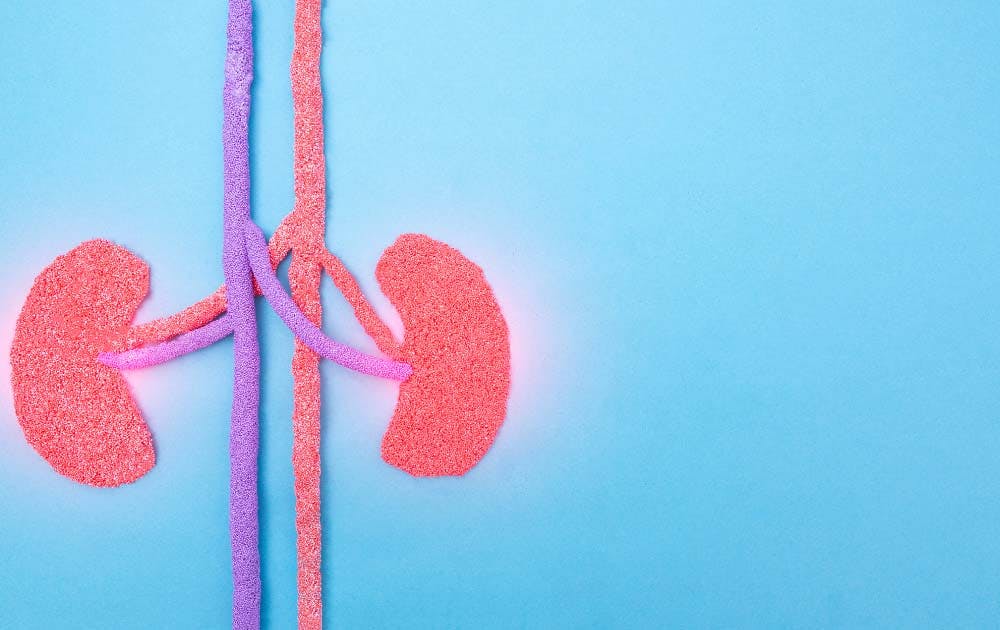May 12, 2022
Kidney Stone Causes and Treatments

When there are high levels of minerals, calcium, uric acid, and other substances in the urine, crystals can form. These crystals attach together, creating kidney stones.
Kidney stones can be as small as a grain of sand but can get as large as a golfball if they don't pass through your urine and out of your body.
The National Kidney Foundation reports that more than half a million people go to the emergency room yearly for kidney stone-related problems. So it's safe to say they are pretty common. We put together this guide to help you know what causes stones to form and what treatment options are available.
Types of kidney stones
Calcium oxalate(most common)- Stones that form when calcium combines with oxalate in the urine.
Uric acid - Mostlyoccurs in people who don't drink enough water or have a diet high in animal protein. These stones are also common in those with gout, a family history of this kind of kidney stone, or who've had chemotherapy.
Struvite- These stones usually form due to certain urinary tract infections. They can also become large very quickly.
Cystine- The hereditary genetic disorder cystinuria causes excessive amounts of the amino acid cystine to collect in the urine, causing stones to form.
Signs and symptoms of kidney stones
Some stones pass through on their own without showing any symptoms. However, if a kidney stone becomes too large or gets stuck in your urinary tract, you may experience:
severe pain, usually in the lower back or side of the abdomen
blood in the urine
vomiting
fever and chills
smelly or cloudy looking urine
feeling the need to urinate frequently
pain or burning sensation when urinating
What causes kidney stones?
Several causes and risk factors can lead to kidney stones.
Diet
What you eat can have an impact on stone development. If your diet is high in meat, poultry, sugars, and sodium, you are at risk because these foods contain substances, like oxalate, that make up kidney stones.
Water and fluid intake
Urine is responsible for eliminating many chemicals and waste that makeup kidney stones. When we don't drink enough fluids, especially water, our bodies become dehydrated, causing concentrated urine or low urine output.
Family history
Kidney stones are heredity, so if someone in your family has had kidney stones, you have a greater chance of developing them.
If you've had kidney stones in the past, you're also at an increased risk of developing another.
Medical conditions
Certain medical ailments and diseases can cause kidney stones. These medical conditions include:
Diabetes
Gout
Cystic Fibrosis
Inflammatory Bowel Disease
Medications
Some medicines, as well as vitamin C and calcium supplements increase your risk of developing kidney stones.
These medications include:
HIV medicines (Crixivan)
Certain antibiotics (Cipro, Ceftriaxone)
How to treat kidney stones
If you are experiencing any symptoms, you should see your doctor right away. They will determine the best kidney stone treatment based on the size and cause of the stone.
Your doctor will most likely order blood tests, urine tests, and imaging tests like ultrasound or x-ray.
Small stones
Small stones don't usually require any intense treatment. Your physician may recommend the following to help pass the small stones:
Drinking plenty of fluids- Drinking at least eight glasses a day to increase urine flow and prevent new stones from forming
Pain relievers- Over-the-counter (OTC) pain relievers, like ibuprofen, to help with discomfort from stones passing
Prescription medications- An alpha-blocker, like tamsulosin(Flomax) or nifedipine (Procardia), relaxes your ureter muscles to help the kidney stone pass quicker with less pain.
Larger stones
If your kidney stones are too big to pass on their own, get stuck in your urinary tract, or are causing bleeding, kidney issues, or an infection, you most likely will need more invasive treatment.
These treatment options include:
Using extracorporeal shock waves to break up stones (lithotripsy)
Surgery to remove stones (percutaneous nephrolithotomy)
Using a scope to remove stones (ureteroscopy)
Are kidney stones preventable?
There are ways to reduce the risk or prevent kidney stones from developing. Knowing what type of kidney stone you have or are prone to is important in preventing them.
Kidney stone prevention includes:
Drinking enough fluids every day
Making adjustments to your diet, such as limiting your salt (sodium) and animal protein intake
Medications, such as potassium citrate, allopurinol (Zyloprim)
Hyperparathyroidism surgery- removal of the parathyroid gland
Always consult your doctor before starting or stopping any medication, including OTC, vitamins, and supplements. You should also talk to your healthcare provider before making any dietary changes.
At CareCard, our mission is to help make your prescription payments more affordable, saving members up to 85% on prescription drugs and medications. Learn how CareCard can help make your medication payments more manageable.